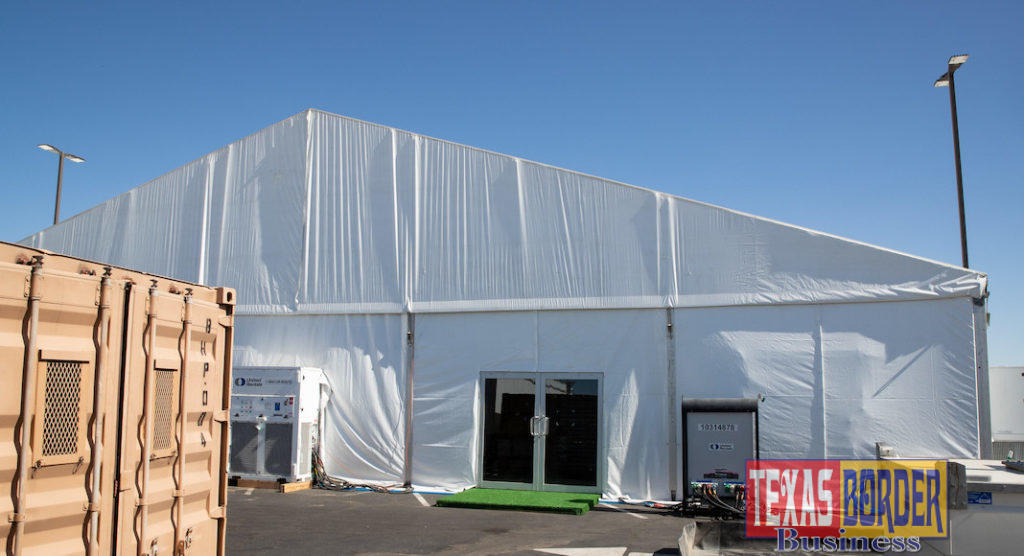Congressman continues to work with DHS and Laredo to find a sensible solution

Texas Border Business
Washington, D.C. — Congressman Henry Cuellar (TX-28) released the following statement on Department of Homeland Security’s (DHS) decision to construct temporary tent housing near the Laredo Port of Entry for the implementation of the Migrant Protection Protocols (MPP) program. On July 18, Congressman Cuellar hosted a meeting with the city of Laredo and DHS officials that allowed the city to propose an alternative to erecting a tent for immigration hearings. Hours after the meeting with the Congressman and officials from Laredo concluded, DHS decided to proceed with the contract to construct the soft-sided tent facility costing taxpayers millions and millions of dollars.
“DHS’s decision to not accept the City of Laredo’s offer of a city-owned facility for conducting asylum hearings is extremely disappointing,” said Congressman Cuellar. “The federal government needs to learn how to collaborate with communities at the border to find sensible solutions. The city guaranteed that their proposal would have met DHS’s operational requirements and all deadlines, provided better working conditions for federal employees, and saved taxpayers millions and millions of dollars.”
“I will continue to work with both the city of Laredo and DHS to see if the city-owned facility could be used in the near future. As the ViceChair of Homeland Security Subcommittee on Appropriations, I will also work with the Committee to ensure that federal tax dollars are wisely used by DHS.”
“I want to thank the City of Laredo, including Mayor Pete Saenz, City Manager Rosario Cabello, Councilman Mercurio Martinez III, City Attorney Kristy Hal, and Public Utility Director John Orfila for their dedication to this issue. I would also like to thank Acting DHS Secretary Kevin McAleenan for meeting with me to consider the city’s proposal. However, I question the counsel that he received by his subordinates within the Department. All of us within the federal government can do better.”
Background
The massive influx of migrants has severely strained our system for processing and housing those who have been apprehended. The Migrant Protections Protocol (MPP) are a U.S. government action whereby certain foreign individuals entering or seeking admission to the U.S. from Mexico – illegally or without proper documentation – may be returned to Mexico and wait outside of the U.S. for the duration of their immigration proceedings, where Mexico will provide them with all appropriate humanitarian protections for the duration of their stay. The subsequent hearings are planned to be held in temporary courtrooms.
To act as a temporary immigration hearing facility, DHS requested funding to erect a 20,000 square foot soft sided tent in Laredo, Texas without consulting with the City. This caused great concern for the city of Laredo due to the fact that a soft-sided tent would create economic and security risks for the city. The current location of the soft-sided facility is located within the 100-year floodplain, which greatly impacts the soft-sided facility anytime it rains. The noise and aesthetic of the current location also causes significant economic burdens to businesses and the tourism industry in the surrounding area. The soft-sided tent will cost taxpayers millions and millions annually.
As a possible solution, the City of Laredo and the Congressman met with DHS officials on Thursday, July 18, 2019, and proposed the use of a nearby city-owned, two-story, unoccupied 21,000+sq. ft facility located adjacent to the Port of Entry that would be at a generous rate for the first 18 months, saving the taxpayers millions and millions of dollars. This facility could be immediately occupied and retrofitted to accommodate DHS requirements which is more cost-effective than maintaining a soft-sided tent. Additionally, the location of the City-owned facility is not as susceptible to flooding, which is not uncommon in this location, as the proposed location of the soft-sided facility.
To see more information on the Migrant Protection Protocols, click here.














